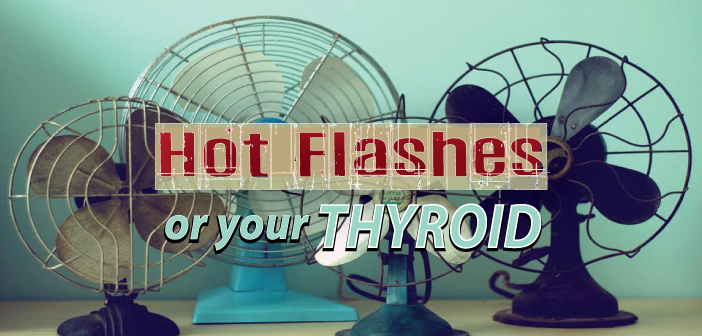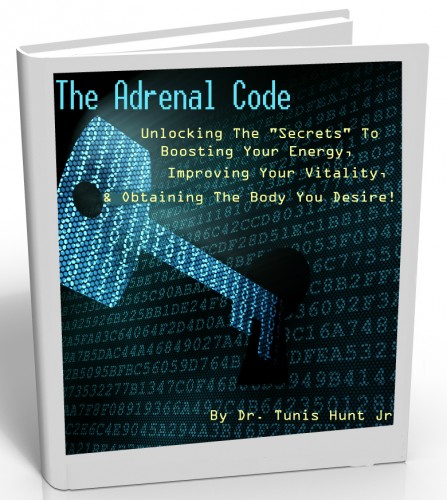
Dr. Tunis Hunt, Guest
Thyroid Nation
Women of all ages get hot flashes
It is estimated that over 75% of perimenopausal women suffer from hot flashes. Although most prominent in women during the menopausal stage of life, any age of women can experience them.
Hot flashes can be described as flushing with a sensation of warmth or heat on the upper body and face. For some women, they may occasionally occur with no real impact on their lives, while other women suffer with intense cyclical occurrences that disrupt their daily lives.
So what causes hot flashes, and is there anything that you can do about them?
Dysfunction of central thermoregulatory centers, caused by decreases in estrogen levels at the time of menopause, has long been postulated to be the cause of hot flashes. And it is this belief that has led to the popular use of hormone replacement therapy.
But is this decrease in estrogen the sole reason women suffer from hot flashes? And why don’t all women require hormone replacement despite lowering estrogen levels?
It turns out that the symptoms of hot flashes women experience are actually due to spikes of epinephrine (adrenaline), a hormone secreted by the adrenal glands. The adrenal glands are primarily responsible for our response to stress. As women get older, however, the adrenals also become a greater source of her sex hormones. As a result, if someone is dealing with chronic stress and is placing a large demand on their adrenals, this can result in lower estrogen levels.
In other words, STRESS can be the largest culprit when it comes to experiencing hot flashes.
I know what you are thinking: stress seems like an easy, non-specific answer to everything. And you may think, “Sure, I have a some stress in my life but nothing so severe that it would cause my hormones to fluctuate like that”.
Unfortunately, stress can and will cause a myriad of problems in your body. And whether or not you believe you are under stress, most people are unaware of how even small daily stressors over time can manifest into larger problems.
As I mentioned, the adrenal glands are responsible for the adaptation to stress. As we perceive stress, our adrenal glands release several hormones, with cortisol being the most prominent. As cortisol is released, the precursors of our other hormones become depleted. This is not a big deal in an acute stressful situation but, when we are constantly releasing cortisol due to chronic stress, this can become a major issue. As a result, our other hormones drop and symptoms such as hot flashes occur.
What are the most common causes of stress?
The major sources of stress can be classified in three primary categories: Emotional, Chemical, and Physical. Almost every single one of us deal with at least one of these sources daily, and in many cases, all of these.
The top sources of emotional stress are:
- Death of a loved one
- Divorce or end of a relationship
- Relationship difficulties, frequent arguments
- Change in residence
- Overwork or termination of employment
- Pregnancy
- Addition to family
- Outstanding personal achievement (graduation, promotion)
- Financial stress (mortgage, loans)
- Personal injury or illness
Research shows that experiencing these as long as 20 years ago could still be manifesting symptoms today.
Chemical stress is present in the toxins in our environment. From the herbicides that we spray on our food, to the hormones we feed our livestock, and the cosmetic cocktail we slather all over our bodies: we are constantly bombarded with chemical exposure.
Physical stress is the constant aches and pains that many of us deal with. Headaches, sore joints and knees, and backaches all cause stress on the body. Not to mention the “good” stress we endure like long periods of exercise or “burning the midnight oil” to get all of our stuff done.
In order to balance your hormones, you need to address the stress in your life and improve your adrenal function. If not, you could supplement with any of the other hormones all you want, but as long as cortisol is burning out of control, you will never experience true balance. This is why so many women continue to suffer with symptoms despite being on hormone replacement therapy, and why they are constantly having to have their levels checked and altered.
So what does this have to do with thyroid health?
It is well documented that the thyroid and the adrenal glands strongly influence each other. Both the adrenals and the thyroid are regulated by the same areas of the brain called the hypothalamus and the pituitary. When one system begins to experience issues, it can negatively affect these control centers and cause problems in the other system.
In addition, when cortisol levels begin to rise, it inhibits the production of the hormone TSH, which decreases the levels of thyroid hormone in the body, as well as, inhibits the conversion of T4 to T3. In other words, high cortisol causes low thyroid. So if you are suffering with low thyroid symptoms, there is a strong possibility that high cortisol or adrenal fatigue could be the underlying culprit. No amount of hormone replacement or medications will improve your symptoms unless this underlying issue is dealt with.
What can you do to eliminate hot flashes?
- Improve your ability to handle stress: Research has shown that women who participated in yoga and other mindful activities such as meditation experienced less hot flashes and were able to deal with them easier.
- Support the adrenals and the HPA axis: Using adaptogenic herbs such as ashwagandha, eleuthero, rhodiola, and maca can be very useful. In addition, using glandulars to support the hypothalamus and pituitary gland can also be helpful.
- Increase Serotonin levels: Serotonin is a neurotransmitter that has been closely linked to estrogen. As estrogen levels decrease so does serotonin levels and vice versa. So by increasing your serotonin levels you will improve your estrogen levels and help eliminate hot flashes and other symptoms such as problems with sleep. A good strategy might be to take tryptophan or 5-HPT which are precursors to serotonin production.
- Balance your thyroid hormones: As I mentioned earlier, your thyroid and adrenal health are closely related. By improving your thyroid health you can improve you adrenal health. Although I find that adrenal health is more likely to negatively affect thyroid health, if you are suffering from an auto-immune condition like Hashimoto’s, addressing the immune issue and thyroid health can greatly improve the health of your adrenal glands.
- Eat a healthy diet: High sugar and refined carbohydrate diets cause major blood sugar spikes and lows which result in chronic stress to the system. As a result, your adrenal glands are constantly being taxed and hormones negatively affected. Eating nutrient dense foods such as good fats, healthy protiens, and copious amounts of vegetables will help your hormone system heal.
- Use hormones as last resort: In some instances the use of bioidentical hormones may be necessary. If you have had your ovaries removed or have been on some sort of medication for an extended period of time, you may require the assistance of hormone therapy. However, it should be the last resort. If you properly evaluate your adrenal health and begin to support your body nutritionally, you should be able to regain your hormone health without the need for hormones and drugs.
 I wrote a FREE eBook called The Adrenal Code. Unlocking the secrets to boosting energy, increasing vitality, and obtaining the body you desire. This eBook is jam-packed with additional information about adrenal health and steps that you can do to improve yours. This would be a great resource for anyone who is struggling with thyroid and hormonal symptoms and is looking for a natural way to improve their health. You can check it out and download your FREE copy here.
I wrote a FREE eBook called The Adrenal Code. Unlocking the secrets to boosting energy, increasing vitality, and obtaining the body you desire. This eBook is jam-packed with additional information about adrenal health and steps that you can do to improve yours. This would be a great resource for anyone who is struggling with thyroid and hormonal symptoms and is looking for a natural way to improve their health. You can check it out and download your FREE copy here.
About the Author
 Dr. Tunis Hunt is on a mission to educate, inspire, and empower the world to reach their health potentials. Practicing health and nutrition since 2005, Dr Hunt has seen thousands of lives changed as he built one of the largest wellness clinics in the United States. Dr. Hunt is the author of 3 books. The Adrenal Code– a guide to help individuals boost their energy, improve their vitality and regain the body they desire, The Healthy Detox Diet and 7 Habits of Healthy People. These books combine to educate, inspire, and empower readers to take control of their health with practical tips and advice. For more interesting articles by Dr. Tunis Hunt, head over to his website, DrTunisJr, follow him on Twitter, and subscribe to his page on YouTube. This article from Dr.Tunis.
Dr. Tunis Hunt is on a mission to educate, inspire, and empower the world to reach their health potentials. Practicing health and nutrition since 2005, Dr Hunt has seen thousands of lives changed as he built one of the largest wellness clinics in the United States. Dr. Hunt is the author of 3 books. The Adrenal Code– a guide to help individuals boost their energy, improve their vitality and regain the body they desire, The Healthy Detox Diet and 7 Habits of Healthy People. These books combine to educate, inspire, and empower readers to take control of their health with practical tips and advice. For more interesting articles by Dr. Tunis Hunt, head over to his website, DrTunisJr, follow him on Twitter, and subscribe to his page on YouTube. This article from Dr.Tunis.
PLEASE take a moment to ‘Like’ us on Facebook and follow us on Twitter and Pinterest. You can also listen to Tiffany and I on Thyroid Nation RADIO.





My nephrologist, where I went to have kidneys checked, told me that adrenals have nothing to do with thyroid. I told him I read a lot of articles which say the opposite, including this one. He answered: “You read too much” -_-
Holy moly. That is insane. I am so sorry. I am making this into a MEME for my Facebook page. Check it out…
http://fb.com/thyroidnation1
Thanks for sharing~
Danna
“…cause a myriad of problems in your body…” should read “…cause myriad problems…”